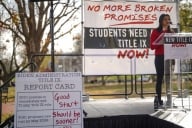You have /5 articles left.
Sign up for a free account or log in.
My nana always told me that it was important to remember where you were when your life was changed. She said that she was a stubborn woman, so getting her to change her mind was a monumental act, worthy of being marked. She was the first person to put the Combahee River Collective statement into my hands and the first one to speak their words over me. I was 20 years old, a junior in college, and I was spending the summer with her, walking around and complaining about boys, and pledging a sorority, and about being bored. I was trying to figure out how I could become the girl that all of the guys wanted to date. I would stand in front of mirror practicing how to look coy, keep my eyes down, and speak in a whisper. I wanted to be that girl. On the day my nana caught me practicing how to swallow my voice and quiet my tongue so that the boys around me could speak loud and clear, she told me that I needed a little Combahee training. She put the statement into my hands and she made me read the words, silently at first and then out loud to her. She said Combahee had changed her mind and made her realize that despite what the world had told her about being black and female in the Jim Crow South, she was a black feminist and she would say it out loud to remind herself of who she was. She made me stand in the backyard and speak the words to the wind, telling me that in those moments when I forgot who I was and who I was meant to be, as a strong black feminist, then the wind would remind me. I found myself that summer, and I became hungry for a taste of the words written by black women. I had read a few books by black women before but no professor had ever used their work as the foundational texts that built their syllabus; therefore, I had never valued them or read them with the same eyes and intensity in which I had been taught to read Walt Whitman, Thomas Jefferson, or Ira Berlin (all men, all white).
But, after I read Combahee, I used to take the books of black women—Alice Walker, Nikki Giovanni, bell hooks, Angela Davis, Assata Shakur, Audre Lorde, Barbara Smith, Paula Giddings—and lay them across my forehead at night in hopes that the words would just get inside of me and fill the places in my soul where I longed to be free. I made myself an honorary member of their collective and I papered my walls with their words. I walked lightly across campus loudly rejecting “pedestals, queenhood, and walking ten paces behind.” I worked for my liberation, fighting against racist and sexist and classist demons lurking on the campus of my HBCU. I was called a radical, a lesbian, and a man hater because I worked to hold black and white men and women accountable for their silence, their complicity, and their own baggage. Combahee gave me the words that I needed to explain the rage that was burning inside of me.
I took the Combahee River Collective Statement to Kenya and used it when I was teaching English classes in my village; I argued about the importance of Combahee with Barbara Jordan when I was studying with her one summer at the University of Texas , Austin; I read Combahee when I was trying to climb Mount Kilimanjaro, when I worked on a fishing boat in Mombasa, and the day I graduated from college. I read the Statement on the morning before I got married and had my husband read me sections when I was going through pre-term labor. I taught Combahee to my black middle school students who were excited to engage with the work of black women and I now teach it to my white college students who reluctantly enter into the text, fighting it every step of the way. Combahee is a life jacket and I strap it on whenever I need to make sure that I am staying above the patriarchal white supremacy waters that threaten to consume me in hopes of quieting my voice.
On the days when I forget who I am and who I am meant to be as a black feminist (mommy, activist, academic, poet, writer…), I go out to my backyard, think about my grandma Nana, the first black feminist in my life, and I read the words from the Combahee River Collective Statement out loud to the wind.
Karsonya Wise Whitehead is an associate professor of Communication and African and African American Studies at Loyola University Maryland and the author of four books, including Letters to My Black Sons: Raising Boys in a Post-Racial America. She is the host of Today With Dr. Kaye, on WEAA 88.9 FM. She can be reached at kewhitehead@loyola.edu or on Twitter @kayewhitehead. Her website is https://kayewisewhitehead.com/.








